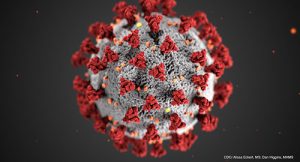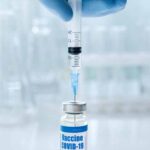 The development of a vaccine for COVID-19 changed the course of the pandemic; however, it also raised questions about whether to withhold or reduce immunosuppressive therapies and other medications for patients with inflammatory, rheumatic and musculoskeletal disease (IRMD), note the authors of a new study published in Annals of the Rheumatic Diseases.
The development of a vaccine for COVID-19 changed the course of the pandemic; however, it also raised questions about whether to withhold or reduce immunosuppressive therapies and other medications for patients with inflammatory, rheumatic and musculoskeletal disease (IRMD), note the authors of a new study published in Annals of the Rheumatic Diseases.
An argument for reducing or discontinuing methotrexate and other immune-suppressing anti-rheumatic drugs at the time of a SARS-CoV-2 vaccination is that it may improve the ability to trigger the humoral antibody response to the vaccine. On the other hand, the clinical significance of such an improved response is yet to be determined, and withholding medications carries the potential risk of exacerbating the disease, noted the study’s author, Pedro Machado, PhD, a professor of rheumatology and neuromuscular diseases at University College London Queen Square Institute of Neurology, in an email interview.
Machado et al. investigated the frequency and factors associated with IRMD flares in patients who were vaccinated against SARS-CoV-2.1
Results from the large, international study showed flares were uncommon following SARS-CoV-2 vaccination among patients with IRMD, a finding that may advance treatment approaches for patients before and after vaccination against COVID-19, say the study’s authors.
Some patients may be concerned the COVID-19 vaccine may trigger flares, or those who are immunosuppressed may worry the vaccine will give them the infection it is meant to prevent. The study’s authors say this research will help patients and their rheumatologists decide together the best approach to management of IRMD with respect to vaccination.
“Our findings confirm that while flares in IRMDs following SARS-CoV-2 vaccination are possible, they are infrequently observed,” says Dr. Machado.
“It’s reassuring data about COVID vaccinations in systemic autoimmune rheumatic diseases,” says Bharat Kumar, MD, MME, FACP, FAAAAI, RhMSUS, physician editor of The Rheumatologist.
Existing Guidance
Recommendations from EULAR and the ACR differ somewhat on how or whether to use anti-rheumatic drugs at or near the time a patient with IRMD receives a COVID-19 vaccine. The ACR recommends withholding methotrexate and certain other drugs in patients with controlled disease; however, EULAR does not recommend reducing or halting anti-rheumatic drugs, with the exception of rituximab.
The ACR guidelines and guidance are intended to be adaptable, living documents that get updated as evidence evolves, notes Jeffrey Curtis, MD, MS, MPH, Marguerite Jones Harbert-Gene Ball Endowed professor of medicine in the Division of Clinical Immunology and Rheumatology at the University of Alabama at Birmingham.2 Therefore, the guidance on whether to hold or delay immunosuppressive medications in relation to timing a COVID-19 vaccine can change in the face of new evidence, and more recent guidance by the Centers for Disease Control & Prevention may supersede earlier guidance, Dr. Curtis said in an email interview.
An earlier study by Dr. Machado and other researchers indicated COVID-19 vaccines were well tolerated by most patients with IRMD and that disease flares were uncommon, occurring in 4.4% of patients with 1.5% who required changes to medication. Other smaller studies have looked at flares reported by patients and found a higher flare rate following vaccination, but often did not distinguish IRMD flares from short-term vaccine reactogenicity.
The New Study
In this larger, international study, Dr. Machado and fellow researchers gathered data on demographics, primary IRMD diagnosis and key medications, as well as vaccine type, date given and number of doses. Disease activity was assessed at first dose under the four categories of remission, low, moderate or high disease activity. It was assessed again after vaccination for development of an IRMD flare and for any medication changes that were added or increased in response to a flare.
Researchers reviewed physician-reported flares using the EULAR coronavirus vaccine (COVAX) registry, which includes data from several, mostly European, countries. Data were recorded from February 2021 to October 2022 by rheumatologists or their clinical team members into a secure web application or transferred from a national registry.
The patient population included only people who had received one or two COVID-19 vaccines and had a pre-existing IRMD diagnosis. Patients were excluded from the study if they received a combination of vaccines from different brands.
Medications documented at the time a COVID-19 vaccine was given included disease-modifying anti-rheumatic drugs (DMARDs), such as methotrexate and leflunomide; biologic DMARDs, such as rituximab and belimumab; tumor necrosis factor (TNF) inhibitors; Janus kinase (JAK) inhibitors; immunosuppressants; and other drugs, including intravenous immunoglobulin and antifibrotics.
Flares were defined by signs and symptoms local physicians interpreted as suggesting a post-vaccination IRMD flare. Information was collected about the type and severity of flares, changes in anti-rheumatic medication and time between vaccination and the flare.
The average age of patients with IRMD was 58, and more than two-thirds (68%) were women.
Most patients had inflammatory joint disease (71%), followed by connective tissue disease (18%), vasculitis (9.9%) and other IRMDs (1.7%). Nearly two-thirds of IRMD primary diagnoses were rheumatoid arthritis (36%), axial spondyloarthritis (16%) and psoriatic arthritis (12%).
Methotrexate was the most common individual medication used, followed by glucocorticoids and TNF inhibitors. DMARDs were the most frequently used medication groups, followed by immunosuppressants.
Most patients—just over 82%—received two doses of a vaccine, and 18% of patients received one dose. The Pfizer/BioNtech COVID-19 vaccine was the most common administered among patients in the study, with 74.1% receiving two doses and 42.8% one dose. AstraZeneca and Moderna vaccines were the second and third most common in the study, respectively.
The Results
Among the 7,336 patients with IRMD, 272 (3.7%) suffered flares, according to the study. Even fewer patients, 121 (1.6%), had flares that required additional treatment with either new medication or increased dosage of medication prescribed before vaccination.
Key factors associated with decreased odds for flares included:
- Patients of higher age;
- Vaccines other than the brands Pfizer, AstraZeneca and Moderna; and
- Treatment with medications methotrexate and rituximab vs. no anti-rheumatics.
The authors note that the number of other vaccines was small, so the above result related to brands should be interpreted with caution.
“Importantly, we found that higher disease activity and cessation/reduction of anti-rheumatic medications before or after vaccinations were associated with increased probability of flare, both for flares in general as well as for flares requiring starting a new anti-rheumatic medication or change of dose in current medication,” state the authors.
“This finding highlights the importance of IRMD control when considering vaccination,” says Dr. Machado.
Researchers did not find an association between the type of IRMD and the risk of flare after vaccination. “This suggests that other factors, such as level of disease activity and medication, are driving the risk of flare, rather than the specific IRMD,” says Dr. Machado.
Flares were more likely to occur in younger patients and females, but such associations were only seen for flares in general and not those that required starting a new anti-rheumatic medication or dose change in current medication, states the study article.
“Therefore, these associations were less robust,” notes Dr. Machado. “The reasons for an association with female sex are unclear, but could be related [to] hormonal factors, while the association with younger age could be related to a more exuberant immunological response to the vaccine.”
Limitations
The article points out that we have limited knowledge surrounding the use, reduction or discontinuation of anti-rheumatic drugs with respect to the timing of SARS-CoV-2 vaccination.
“These findings will help inform vaccination strategies in patients with IRMDs, specifically decisions regarding stopping or reducing anti-rheumatic medications around the time of vaccination,” states the article.
Dr. Curtis says the results are interesting and notes that although flares were uncommon with less than 5% of patients experiencing a flare, holding medication around the time of the COVID-19 vaccine yielded an increased risk of a flare.
“Given the minimal demonstrated benefit of holding most immunomodulatory medications—except, perhaps, for methotrexate—to boost vaccine response, this finding is helpful to guide recommendations to patients around the time of vaccination,” he says.
Catherine Kolonko is a medical writer based in Oregon.
References
- Farisogullari B, Lawson-Tovey S, Hinrich KL et al. Factors associated with disease flare following SARS-CoV-2 vaccination in people with inflammatory rheumatic and musculoskeletal diseases: Results from the physician-reported EULAR Coronavirus Vaccine (COVAX) Registry. Ann Rheum Dis. 2024 Oct 21;83(11):1584–1595
- ACR. The ACR’s COVID-19 vaccine clinical guidance summary v5. The Rheumatologist. 2022. Online only.





